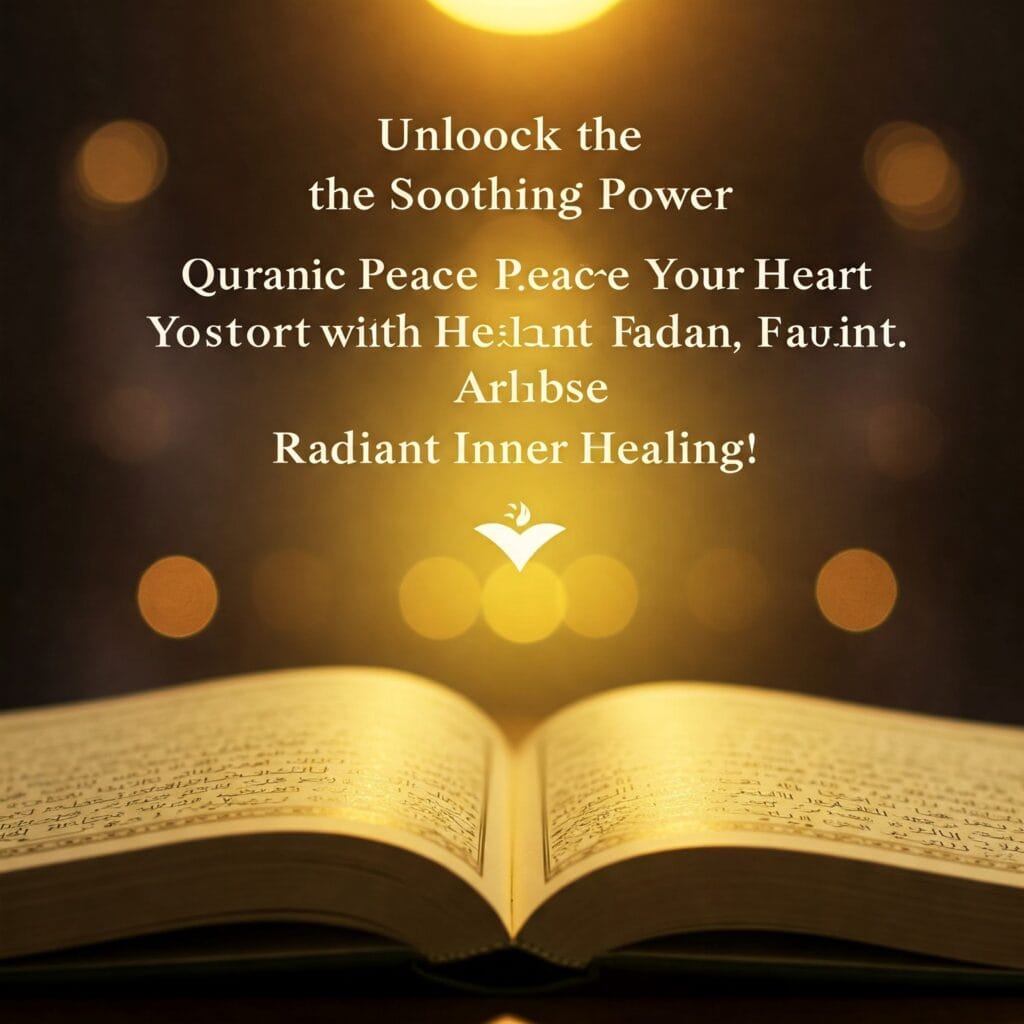The Quran, the divine revelation received by the Prophet Muhammad (peace be upon him), serves as a spiritual and psychological guide for over 1.9 billion Muslims, offering profound insights into achieving mental peace and inner healing. In an era of rising mental health challenges in 2025, marked by stress, anxiety, and digital overload, the Quran’s timeless wisdom provides a holistic framework for emotional resilience, spiritual tranquility, and psychological well-being. Rooted in its verses and the Sunnah, the Quran emphasizes concepts like sabr (patience), tawakkul (trust in Allah), and dhikr (remembrance of Allah) to foster inner calm and heal emotional wounds. This in-depth article explores the Quranic teachings on mental peace and inner healing, examining key verses, prophetic practices, practical applications, and contemporary contexts. By addressing theological foundations, debunking misconceptions, and highlighting modern initiatives, we aim to illuminate how the Quran nurtures a serene heart and a healed soul.

Theological Foundations of Mental Peace and Inner Healing
Quranic Promise of Tranquility
The Quran explicitly links faith and remembrance of Allah to mental peace, offering solace to troubled hearts:
“Those who have believed and whose hearts are assured by the remembrance of Allah. Unquestionably, by the remembrance of Allah hearts find rest.” [Ar-Ra’d 13:28]
This verse underscores dhikr as a powerful tool for calming the mind, affirming that connection with Allah brings sakina (tranquility). Similarly:
“It is He who sent down tranquility into the hearts of the believers that they would increase in faith along with their [present] faith…” [Al-Fath 48:4]
Sakina is a divine gift, soothing emotional turmoil and fostering resilience.
Relief Through Trust in Allah
The Quran encourages tawakkul, reliance on Allah, as a means to alleviate anxiety and fear:
“And whoever relies upon Allah—then He is sufficient for him…” [At-Talaq 65:3]
This principle helps believers surrender worries to divine wisdom, reducing mental burdens. The Quran also reassures:
“No disaster strikes except by permission of Allah. And whoever believes in Allah—He will guide his heart…” [At-Taghabun 64:11]
This guidance fosters emotional stability during adversity.
Healing Through Patience and Prayer
The Quran prescribes sabr (patience) and salat (prayer) as remedies for distress:
“And seek help through patience and prayer; and indeed, it is difficult except for the humbly submissive [to Allah].” [Al-Baqarah 2:45]
Patience and prayer anchor the soul, providing a structured path to process pain and find peace.
Prophetic Practices for Inner Healing
The Prophet Muhammad (peace be upon him) exemplified Quranic teachings on mental peace, offering practical guidance:
- Dhikr for Calmness: He taught supplications for anxiety, such as: “O Allah, I seek refuge in You from anxiety and sorrow…” [Sahih al-Bukhari 6363]. This aligns with Ar-Ra’d 13:28.
- Tawakkul in Action: During hardships, like the boycott in Mecca, the Prophet relied on Allah, reflecting At-Talaq 65:3, inspiring companions to remain steadfast.
- Community Support: He fostered emotional healing through communal worship and empathy, saying, “The believer who mixes with people and endures their harm is better than the one who does not” [Sunan Ibn Majah 4032], encouraging social connection.
Core Principles of Quranic Mental Peace
1. Dhikr as Emotional Anchor
Regular remembrance of Allah, through phrases like “SubhanAllah” or “La ilaha illAllah,” stabilizes emotions, as per Ar-Ra’d 13:28. Dhikr shifts focus from worldly stress to divine mercy.
2. Tawakkul for Stress Relief
Trusting Allah’s plan (At-Talaq 65:3) reduces overthinking and fear of the future, promoting mental clarity and confidence in divine provision.
3. Sabr as Resilience
Patience during trials, as urged in Al-Baqarah 2:153 (“Indeed, Allah is with the patient”), builds emotional strength, transforming suffering into growth.
4. Salat as Therapeutic Ritual
The five daily prayers structure the day, offering moments of reflection and connection with Allah (Al-Baqarah 2:45), soothing the mind through routine and devotion.
5. Gratitude for Contentment
The Quran encourages shukr (gratitude):
“And [remember] when your Lord proclaimed, ‘If you are grateful, I will surely increase you [in favor]…’” [Ibrahim 14:7]
Gratitude shifts perspective, fostering contentment and reducing negative emotions.
Practical Applications in Muslim Life
Personal Practices
- Daily Dhikr: Muslims recite morning and evening adhkar, like those in Hisn al-Muslim, to maintain peace, aligning with Ar-Ra’d 13:28. Apps like Athan provide reminders.
- Mindful Salat: Performing prayers with khushu (focus) serves as meditation, grounding individuals, per Al-Baqarah 2:45.
- Journaling Gratitude: Writing three things to be thankful for daily, inspired by Ibrahim 14:7, enhances emotional well-being.
Community Support
- Mosque Programs: Mosques in 2025, like those in Malaysia and Canada, offer Quran recitation circles and dua sessions, fostering collective healing (Ar-Ra’d 13:28).
- Counseling Services: Islamic centers, such as the Khalil Center in the US, integrate Quranic principles with therapy, addressing anxiety with tawakkul and sabr.
Social Connection
The Quran emphasizes community:
“And cooperate in righteousness and piety…” [Al-Ma’idah 5:2]
Joining support groups or volunteering, as encouraged by Sunan Ibn Majah 4032, combats isolation and promotes healing.
Common Misconceptions and Clarifications
Misconception 1: Faith Alone Solves Mental Health Issues
Myth: The Quran suggests spiritual practices replace professional help. Clarification: While Ar-Ra’d 13:28 promotes dhikr, the Quran also values seeking remedies (Sahih al-Bukhari 5678). Scholars like Dr. Rania Awaad advocate combining therapy with faith.
Misconception 2: Anxiety Reflects Weak Faith
Myth: Feeling anxious or sad indicates a lack of iman. Clarification: The Quran acknowledges human emotions (At-Taghabun 64:11). The Prophet’s supplications for anxiety (Sahih al-Bukhari 6363) normalize seeking relief.
Misconception 3: Tawakkul Means Passivity
Myth: Relying on Allah (At-Talaq 65:3) means avoiding effort. Clarification: Tawakkul involves action and trust, as the Prophet tied his camel and trusted Allah (Jami’ at-Tirmidhi 2517).
Misconception 4: Mental Peace Ignores Real Problems
Myth: Quranic peace dismisses practical challenges. Clarification: Al-Baqarah 2:45 pairs sabr with salat, encouraging proactive coping while seeking divine aid.
Contemporary Contexts in 2025
Global Trends
- Mental Health Awareness: Muslim organizations like the Muslim Wellness Foundation host webinars on Quranic coping strategies, integrating Ar-Ra’d 13:28 with mindfulness.
- Digital Tools: Apps like Sabr and MyDua offer guided dhikr and dua, helping users practice Ar-Ra’d 13:28 amidst busy schedules.
- Islamic Therapy: Clinics in the UK and UAE, like Sakoon, blend Quranic principles with cognitive behavioral therapy, promoting tawakkul (At-Talaq 65:3).
- Youth Initiatives: Muslim youth in Australia and South Africa run peer support groups, using Al-Ma’idah 5:2 to address social media-induced stress.
Challenges
- Stigma Around Mental Health: Cultural taboos in some Muslim communities discourage seeking help, contrary to Sahih al-Bukhari 5678. Campaigns by Yaqeen Institute normalize therapy.
- Digital Overload: Social media anxiety challenges Ar-Ra’d 13:28’s call for peace. Digital detox programs inspired by the Quran gain traction.
- Access to Resources: Rural Muslim communities lack mental health services. Online platforms like SeekersGuidance bridge gaps with Quranic guidance.
Practical Steps for Mental Peace and Healing
To apply Quranic teachings, individuals can:
- Practice Daily Dhikr: Recite “Hasbiyallahu la ilaha illa Huwa” (At-Talaq 65:3) or use apps like MyDua for guided supplications, per Ar-Ra’d 13:28.
- Perform Salat Mindfully: Focus on prayer meanings, using resources like Shaykh Omar Suleiman’s videos, to embody Al-Baqarah 2:45.
- Cultivate Sabr: Reflect on trials as growth, journaling insights from Al-Baqarah 2:153, to build resilience.
- Practice Tawakkul: Plan actions but surrender outcomes to Allah, inspired by Jami’ at-Tirmidhi 2517, reducing worry.
- Express Gratitude: List five blessings daily, per Ibrahim 14:7, using apps like Gratitude to shift mindset.
- Seek Community: Join mosque support groups or online forums like Rabata, reflecting Al-Ma’idah 5:2.
- Access Professional Help: Consult Islamic therapists via Khalil Center, combining faith (Ar-Ra’d 13:28) with science, per Sahih al-Bukhari 5678.
- Limit Digital Stress: Schedule screen-free hours, focusing on Quranic reflection (Aal-E-Imran 3:190), to restore calm.
Conclusion
The Quran’s teachings on mental peace and inner healing offer a timeless roadmap for emotional and spiritual well-being. Through verses like Ar-Ra’d 13:28, Al-Baqarah 2:45, and At-Talaq 65:3, it prescribes dhikr, sabr, tawakkul, and salat as tools to cultivate tranquility and heal emotional wounds. The Prophet’s practices, from supplications to community support, bring these principles to life. In 2025, digital tools, Islamic therapy, and youth initiatives amplify the Quran’s guidance, despite challenges like stigma and digital stress. By embracing these teachings, Muslims can find solace and strength, fulfilling the Quranic promise:
“Indeed, with hardship [will be] ease.” [Ash-Sharh 94:6]
Must read:
- Unleashing the Revolutionary Spirit: Quranic Freedom Ignites Critical Thought for a Brighter Future!
- Discover the Transformative Power: Quranic Justice Unveiled for a Fairer, More Equitable World!
- Unleash the Mighty Power of Healing Duas to Conquer Anxiety, Depression, and Hardship!
Frequently Asked Questions (FAQs)
u003cstrongu003eHow does the Quran promote mental peace?u003c/strongu003e
Verses like Ar-Ra’d 13:28 link dhikr to tranquility, offering divine reassurance and emotional calm.
u003cstrongu003eCan Muslims seek therapy?u003c/strongu003e
Yes, Sahih al-Bukhari 5678 supports seeking remedies, and scholars advocate combining therapy with Quranic practices.
u003cstrongu003eDoes anxiety mean weak faith?u003c/strongu003e
No, the Prophet’s supplications (Sahih al-Bukhari 6363) and At-Taghabun 64:11 normalize emotional struggles.
u003cstrongu003eWhat is tawakkul in mental health?u003c/strongu003e
Tawakkul (At-Talaq 65:3) involves effort and trust in Allah, reducing anxiety by surrendering outcomes, per Jami’ at-Tirmidhi 2517.
u003cstrongu003eHow does salat help emotionally?u003c/strongu003e
Salat (Al-Baqarah 2:45) provides structure and connection with Allah, acting as a meditative practice for calm.
u003cstrongu003eWhy do some Muslims avoid mental health help?u003c/strongu003e
Cultural stigmas, not Quranic teachings, create barriers. Campaigns align with Sahih al-Bukhari 5678 to normalize care.


Post Comment